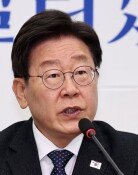Worrisome reshuffle of foreign policy and national security team
Worrisome reshuffle of foreign policy and national security team
Posted June. 20, 2020 07:55,
Updated June. 20, 2020 07:55
South Korean President Moon Jae-in accepted Unification Minister Kim Yeon-cheol’s resignation Friday. It came two days after Kim offered to resign to take responsibility for the worsening of the inter-Korean ties, including North Korea’s destruction of the inter-Korean liaison office at the Kaesong Industrial Park in the North at the excuse of propaganda leaflets sent to the North.
The South Korean government cannot afford to keep the unification minister’s post vacant for long amid escalating tension on the Korean Peninsula resulting from Pyongyang’s threatening to take military actions. Watchers already mention as potential candidates Reps. Lee In-young and Woo Sang-ho of the ruling Democratic Party, and former Presidential Chief of Staff Lim Jong-seok. Since the first unification ministers of the incumbent administration were a bureaucrat and a scholar, the rumors apparently reflect the ruling party’s expectations that the government needs to shift the mood by appointing a politician sensitized in politics to the post.
The replacement of the unification minister is a natural outcome of the failure in inter-Korean relations, which blindly placed emphasis on easing sanctions against the North through the policy of “inter-Korean economic cooperation first,” while disregarding Pyongyang’s denuclearization. For this reason, it is also inappropriate for the vice unification minister to act as the minister for a long time as he would only emphasize inter-Korean cooperation and visit different provincial areas to block North Korean defectors’ groups from flying propaganda leaflets to the North until right before the North actually exploded the liaison office to completely destroy it. Since South Korea’s North Korea policy, which the incumbent administration has pushed to implement amid optimism that Kim Jong Un will denuclearize his nation, has ended in failure, the South Korean government needs to shift policy direction through a comprehensive reshuffle of the Unification Ministry’s leadership.
However, people who are rumored to be potential candidates were core members of the National Federation of University Student Representatives (Jeondae-hyeop), also known as National Liberation (NL) Jusapa (Juchesasang-pa), who were student activists during their college years. It is worrisome that a unification minister, who still maintains fantasy towards the North, will somehow come to assume the post at a time when Seoul must cool-heartedly deal with the situation around the Pyongyang regime. Moreover, when President Moon Jae-in met with elders or retired national leaders recently, he singled out his government’s failure to ban propaganda leaflets and Washington’s policymaking structure as the reasons for the collapse in its North Korea policy, and expressed his commitment to resolve the situation through patience. As long as the president continues to recognize the situation as such, whoever takes the leadership of Seoul’s foreign policy and national security team, it would be difficult to switch policy direction.
The selection of the unification minister will inevitably affect the follow-up reshuffle of the foreign policy and national security team lineup. Since the reshuffle of the team takes place amid a national crisis, the Moon administration needs to take a bold decision of hiring non-partisan leaders who are armed with ample experience in diplomacy on Pyongyang’s denuclearization and related expertise. If Seoul appoints to the leadership people who will seek to further push for existing policies rather than shifting policy direction, it would be difficult to bring back on track the inter-Korean relations that have already hit the breaking point, and address the widening gap in Seoul-Washington ties.







